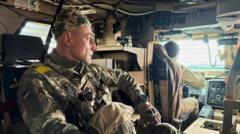The article text:
As peace negotiations unfold in distant arenas, Ukrainian soldiers stationed on the front lines remain deeply skeptical about the prospect of a ceasefire. Despite discussions in Moscow regarding a temporary pause in hostilities, the military activity on the battlefield continues unabated, with troops faced with an unrelenting barrage of attacks.
At a military hospital in eastern Ukraine, the grim realities of warfare are starkly evident. Waves of injured soldiers are transported from the front lines, revealing a poignant contrast between diplomatic discussions and the harsh, brutal consequences of conflict. Underneath the strain of exhaustion, witnesses observe the injured being loaded onto a specially-equipped bus designed to handle medical emergencies on treacherous roads.
The injuries that many soldiers face stem predominantly from increasingly pervasive drone attacks that characterize the modern battlefield. Soldiers like Maksym, enduring multiple shrapnel wounds, voice their feelings of disillusionment regarding potential ceasefires, with Maksym asserting, "I consider Putin a murderer and murderers don't agree so easily." Colleagues echo similar sentiments, doubting the likelihood of any truce while facing daily assaults from Russian forces.
Medical personnel assisting the wounded share their concerns as well. Sofiia, a 22-year-old medical student volunteering with the Hospitallers, implies that talk of peace feels disconnected from their reality, noting, “I cannot believe it, but I really wish it would happen.” Her observations reflect historical patterns where previous ceasefire attempts failed to yield lasting peace, leaving many soldiers and medics dreadfully skeptical.
The broader strategic challenges are underscored by the dire situation at the front, with Ukrainian forces struggling in areas like Kursk. Conversations among soldiers reveal a shared wariness about the future, as they prepare for ongoing combat drills against a backdrop of artillery fire, all while the specter of loss looms over their ranks.
Despite the consistently volatile conditions, there remains a flicker of hope as U.S. military support is reinstated, with troops expressing gratitude for the continued supply of American-made equipment. However, trust in foreign leadership remains tenuous, exemplified by Ivan, a soldier who admits to having doubts about the reliability of support from both U.S. and Russian administrations.
As the conflict continues to rage, the prospect of a ceasefire appears distant, with those entrenched in the realities of war grappling daily with the weight of uncertainty and loss.
As peace negotiations unfold in distant arenas, Ukrainian soldiers stationed on the front lines remain deeply skeptical about the prospect of a ceasefire. Despite discussions in Moscow regarding a temporary pause in hostilities, the military activity on the battlefield continues unabated, with troops faced with an unrelenting barrage of attacks.
At a military hospital in eastern Ukraine, the grim realities of warfare are starkly evident. Waves of injured soldiers are transported from the front lines, revealing a poignant contrast between diplomatic discussions and the harsh, brutal consequences of conflict. Underneath the strain of exhaustion, witnesses observe the injured being loaded onto a specially-equipped bus designed to handle medical emergencies on treacherous roads.
The injuries that many soldiers face stem predominantly from increasingly pervasive drone attacks that characterize the modern battlefield. Soldiers like Maksym, enduring multiple shrapnel wounds, voice their feelings of disillusionment regarding potential ceasefires, with Maksym asserting, "I consider Putin a murderer and murderers don't agree so easily." Colleagues echo similar sentiments, doubting the likelihood of any truce while facing daily assaults from Russian forces.
Medical personnel assisting the wounded share their concerns as well. Sofiia, a 22-year-old medical student volunteering with the Hospitallers, implies that talk of peace feels disconnected from their reality, noting, “I cannot believe it, but I really wish it would happen.” Her observations reflect historical patterns where previous ceasefire attempts failed to yield lasting peace, leaving many soldiers and medics dreadfully skeptical.
The broader strategic challenges are underscored by the dire situation at the front, with Ukrainian forces struggling in areas like Kursk. Conversations among soldiers reveal a shared wariness about the future, as they prepare for ongoing combat drills against a backdrop of artillery fire, all while the specter of loss looms over their ranks.
Despite the consistently volatile conditions, there remains a flicker of hope as U.S. military support is reinstated, with troops expressing gratitude for the continued supply of American-made equipment. However, trust in foreign leadership remains tenuous, exemplified by Ivan, a soldier who admits to having doubts about the reliability of support from both U.S. and Russian administrations.
As the conflict continues to rage, the prospect of a ceasefire appears distant, with those entrenched in the realities of war grappling daily with the weight of uncertainty and loss.


















